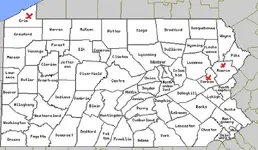- #1
Thread Owner
From wire services / Published: September 23, 2019

The Pennsylvania Department of Agriculture and Health on Saturday warned Pennsylvanians to take precautionary measures against mosquito bites for themselves and their animals – specifically horses – as the rare mosquito-transmitted viral infection Eastern equine encephalitis has been confirmed in Carbon, Erie and Monroe counties.
Eastern equine encephalitis is a virus carried by birds. If a mosquito bites an infected bird, it can then transmit the potentially fatal virus to humans, horses and other birds. Because of the high mortality rate in horses and humans, Eastern equine encephalitis is regarded as one of the most serious mosquito-borne diseases in the United States.
Eastern equine encephalitis, or Triple E, kills three of every 10 people who get it and leaves most survivors with brain damage, according to state officials.
Through mid-September, there have been 18 cases reported to the Centers for Disease Control and Prevention from across the country in 2019, with the majority of the cases in northeastern or mid-Atlantic states. Several cases have been fatal.
When outdoors, people can avoid mosquito bites by properly and consistently using DEET-containing insect repellents and covering exposed skin with lightweight clothing. To keep mosquitoes from entering a home, make sure window and door screens are in place and are in good condition.
Homeowners should take steps to eliminate standing water around their property to reduce mosquito populations.
The symptoms of Eastern equine encephalitis are high fever (103 to 106 degrees), a stiff neck, headache and lack of energy.
hese symptoms typically show up three to 10 days after being bitten by an infected mosquito. Inflammation and swelling of the brain, called encephalitis, can develop. The disease gets worse quickly, and some patients could end up in a coma within a week. This disease can also be fatal, as three out of every 10 people who get the disease die from it.
For information, visit https://www.agriculture.pa.gov/Pages/default.aspx

The Pennsylvania Department of Agriculture and Health on Saturday warned Pennsylvanians to take precautionary measures against mosquito bites for themselves and their animals – specifically horses – as the rare mosquito-transmitted viral infection Eastern equine encephalitis has been confirmed in Carbon, Erie and Monroe counties.
Eastern equine encephalitis is a virus carried by birds. If a mosquito bites an infected bird, it can then transmit the potentially fatal virus to humans, horses and other birds. Because of the high mortality rate in horses and humans, Eastern equine encephalitis is regarded as one of the most serious mosquito-borne diseases in the United States.
Eastern equine encephalitis, or Triple E, kills three of every 10 people who get it and leaves most survivors with brain damage, according to state officials.
Through mid-September, there have been 18 cases reported to the Centers for Disease Control and Prevention from across the country in 2019, with the majority of the cases in northeastern or mid-Atlantic states. Several cases have been fatal.
When outdoors, people can avoid mosquito bites by properly and consistently using DEET-containing insect repellents and covering exposed skin with lightweight clothing. To keep mosquitoes from entering a home, make sure window and door screens are in place and are in good condition.
Homeowners should take steps to eliminate standing water around their property to reduce mosquito populations.
The symptoms of Eastern equine encephalitis are high fever (103 to 106 degrees), a stiff neck, headache and lack of energy.
hese symptoms typically show up three to 10 days after being bitten by an infected mosquito. Inflammation and swelling of the brain, called encephalitis, can develop. The disease gets worse quickly, and some patients could end up in a coma within a week. This disease can also be fatal, as three out of every 10 people who get the disease die from it.
For information, visit https://www.agriculture.pa.gov/Pages/default.aspx
Last edited:



